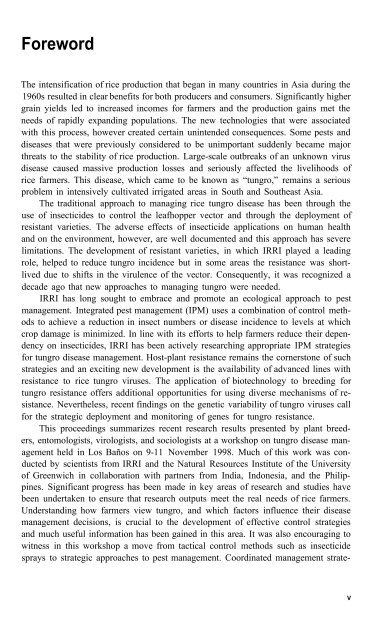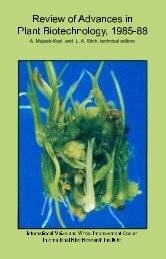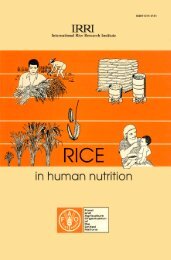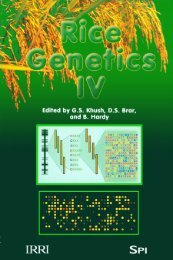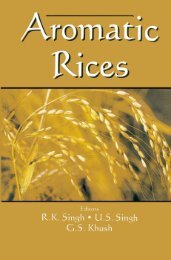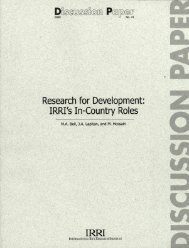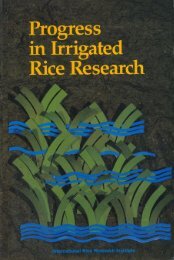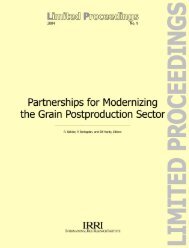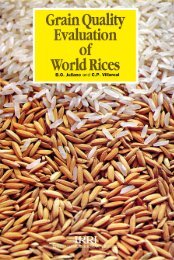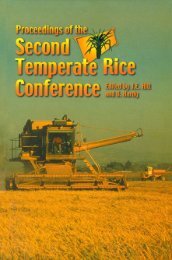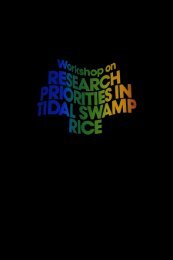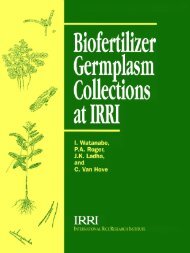Rice tungro disease management - IRRI books - International Rice ...
Rice tungro disease management - IRRI books - International Rice ...
Rice tungro disease management - IRRI books - International Rice ...
You also want an ePaper? Increase the reach of your titles
YUMPU automatically turns print PDFs into web optimized ePapers that Google loves.
ForewordThe intensification of rice production that began in many countries in Asia during the1960s resulted in clear benefits for both producers and consumers. Significantly highergrain yields led to increased incomes for farmers and the production gains met theneeds of rapidly expanding populations. The new technologies that were associatedwith this process, however created certain unintended consequences. Some pests and<strong>disease</strong>s that were previously considered to be unimportant suddenly became majorthreats to the stability of rice production. Large-scale outbreaks of an unknown virus<strong>disease</strong> caused massive production losses and seriously affected the livelihoods ofrice farmers. This <strong>disease</strong>, which came to be known as “<strong>tungro</strong>,” remains a seriousproblem in intensively cultivated irrigated areas in South and Southeast Asia.The traditional approach to managing rice <strong>tungro</strong> <strong>disease</strong> has been through theuse of insecticides to control the leafhopper vector and through the deployment ofresistant varieties. The adverse effects of insecticide applications on human healthand on the environment, however, are well documented and this approach has severelimitations. The development of resistant varieties, in which <strong>IRRI</strong> played a leadingrole, helped to reduce <strong>tungro</strong> incidence but in some areas the resistance was shortliveddue to shifts in the virulence of the vector. Consequently, it was recognized adecade ago that new approaches to managing <strong>tungro</strong> were needed.<strong>IRRI</strong> has long sought to embrace and promote an ecological approach to pest<strong>management</strong>. Integrated pest <strong>management</strong> (IPM) uses a combination of control methodsto achieve a reduction in insect numbers or <strong>disease</strong> incidence to levels at whichcrop damage is minimized. In line with its efforts to help farmers reduce their dependencyon insecticides, <strong>IRRI</strong> has been actively researching appropriate IPM strategiesfor <strong>tungro</strong> <strong>disease</strong> <strong>management</strong>. Host-plant resistance remains the cornerstone of suchstrategies and an exciting new development is the availability of advanced lines withresistance to rice <strong>tungro</strong> viruses. The application of biotechnology to breeding for<strong>tungro</strong> resistance offers additional opportunities for using diverse mechanisms of resistance.Nevertheless, recent findings on the genetic variability of <strong>tungro</strong> viruses callfor the strategic deployment and monitoring of genes for <strong>tungro</strong> resistance.This proceedings summarizes recent research results presented by plant breeders,entomologists, virologists, and sociologists at a workshop on <strong>tungro</strong> <strong>disease</strong> <strong>management</strong>held in Los Baños on 9-11 November 1998. Much of this work was conductedby scientists from <strong>IRRI</strong> and the Natural Resources Institute of the Universityof Greenwich in collaboration with partners from India, Indonesia, and the Philippines.Significant progress has been made in key areas of research and studies havebeen undertaken to ensure that research outputs meet the real needs of rice farmers.Understanding how farmers view <strong>tungro</strong>, and which factors influence their <strong>disease</strong><strong>management</strong> decisions, is crucial to the development of effective control strategiesand much useful information has been gained in this area. It was also encouraging towitness in this workshop a move from tactical control methods such as insecticidesprays to strategic approaches to pest <strong>management</strong>. Coordinated <strong>management</strong> strate-V


